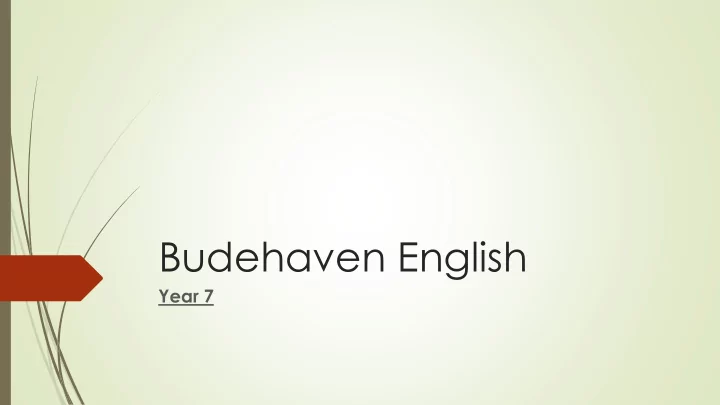

Budehaven English Year 7
The New Curriculum The new curriculum has been introduced this September. Year 7 will be the third cohort through with final term exams in Year 11. The English exam will be single entry, no higher or foundation tiers. Year 7 is currently taught in mixed ability groups. (W e do have a specialised provision for students who need additional support in the Literacy based subjects. The PaCE group are taught separately for these subjects in Year 7 only.) All lessons are differentiated to accommodate the needs of the students within the classes. Throughout the year, GCSE skills such as deduction, inference, language analysis and comprehension will also be taught to underpin student learning in preparation for Years 10 and 11. This will be reinforced each year as students progress through the school.
The Curriculum The new English curriculum favours spending more time on individual texts and studying them in greater depth. To reflect this, we have a scheme of work each term with Literature at its heart. To ensure students are reaching high standards of literacy across all subjects, we will maintain our focus on Spelling, Punctuation and Grammar. All students will be given time to develop and correct their work in lessons. A key classroom strategy is to encourage students to be more confident in their literacy . This is supported by self-assessment and peer assessment in class. Sometimes they forget how much they knew in Year 6!
Expectations All students are expected to bring a novel or appropriate magazine into class to read at the beginning of lessons. IPads and tablets are acceptable but reading apps on mobile phones is not. We have a zero tolerance approach to phones and headphones in English. Students will also be actively encouraged to read works which stretch and challenge them . Class teachers will suggest texts where appropriate. All homework and classwork is completed to a standard that is representative of student target grades; work will be returned if it lacks effort … Homework will be set once a week on Planner Live. Students are expected to spend an hour (minimum) completing this.
Around the World in 80 Days Students will explore both the historical and • social context of this classic novel and form opinions of the events and experiences that shaped it. They will focus on structure and language in • the novel, identifying how Jules Verne communicates complex issues and ideas in a vivid and engaging manner. In class, students will be encouraged to write • extended responses to the text, either in character or in answer to an essay question. We encourage students to have their own • copy of the novel (if possible!) so that they can record their own ideas and truly immerse themselves in the story.
LANGUAGE THROUGH TIME What makes a literary hero? Students will be studying a variety of texts such as Beowulf , The Happy Prince , Harry Potter; Jane Eyre; Lyra Silvertongue and Melba Beals to establish how a hero/heroine is created and how their journey is constructed by writers. Students will be assessed on both their reading and writing skills throughout the unit. Students will respond to the texts in a number of ways. Informative writing for a magazine : ‘What makes a great Literary Hero? Comparative essay : This will take the form of comparing three literary heroes/heroines over time.
Shakespeare and Literary text. Comparative study Students will study a variety of texts relating to different contexts and periods. All students will study a Shakespeare play. The Tempest, As You Like It, Midsummer Night’s Dream . Students will be taught how to draw out and respond to comparisons in the texts in terms of themes, characters, ideas and language devices used by the writer. Literary texts will vary but will be post 19 th Century as prescribed by the new programme of study for English. Literary texts will include: Harry Potter, Dick Turpin, Beowulf, Batman, Florence Nightingale; Mary Seacole diaries.
How can you support your child? Check they always have their reading book. Support with homework where possible. Correct spellings, punctuation and grammar where possible. There are many resources to support parents with these challenges! Ask us… Encourage them to try new and more challenging genres and writers. Students are encouraged to critique their own work in class, so please expect this in homework also. We are trying to ensure that our students write consistently for longer, so please support your children by asking them to consider how much they’re writing. E xplore SAM Learning’s resources and activities to develop and progress your child’s understanding of the topics being studied. Details of SAM learning are on our school website. As always, we truly appreciate the support you give your children in English. THANK YOU FOR YOU ATTENTION!
Recommend
More recommend